Complete these four courses led by Dr. Melanie Smith and earn the Eating Disorders Training Certificate (EDTC)
Up to 24 CE hours (6 of which are Ethics) available for behavioral health clinicians completing each of the four online self-study courses
This training program offers a bundle of four courses and the Eating Disorders Training Certificate (EDTC). The courses of the EDTC program offer clinicians comprehensive knowledge on the etiology, assessment and treatment of eating disorders. Exploration of risk factors for the development of eating disorders, including the ongoing impact of sociocultural influences will be discussed in this training. Instruction on how to assess for eating disorder symptomatology and severity, including differential diagnosis will be provided. This training will provide an overview of current research in the field with an emphasis on evidence-based treatment approaches for various eating disorders and populations. This training empowers clinicians with the knowledge and interventions to confidently treat clients with eating disorders, as well as resources for complex cases that require additional support.
Earning a certification, credential, or certificate in a specialty validates your knowledge and expertise and demonstrates your commitment to providing high-quality, evidence-based treatment. Upon completing the program, you'll receive your Eating Disorders Training Certificate (EDTC) to be added to your existing credentials.
Enrollment in the 4-course bundle is available for a savings of $125
Earning the Eating Disorders Training Certificate (EDTC) requires completion of four courses. Registration for individual self-study courses can be made individually, or as a four-course bundle. Please contact our support team for details or to inquire about your progress toward earning the EDTC.
Individual event registration is also available:
6 CEs
Eating disorders are serious illnesses that can impact all areas of functioning and have the second highest mortality rate of any mental health condition. Despite misleading stereotypes about who suffers from eating disorders, we know that people of all genders, ages, races, ethnicities, sexual orientations, religious beliefs, socioeconomic statuses, body shapes, and weights can develop eating disorders. It is estimated that nearly 30 million individuals in the U.S. will suffer from an eating disorder during their lifetime, with prevalence rates in children and adolescents increasing by over 100% in the past decade. There are numerous etiological factors that influence the development and maintenance of eating disorders, including the many sociocultural stressors of the current day including the long-term impacts of the COVID-19 pandemic. For these reasons, it is imperative for clinicians to have adequate training and knowledge in the treatment of these complex and often misunderstood conditions.
This course provides mental health clinicians with an overview of the genetic, biological, psychological, and myriad of sociocultural factors that contribute to the rising numbers of individuals affected by eating disorders. Assessment tools, as well as important considerations for culturally competent assessment eating disorder symptomatology and severity are explored. Strategies for differential diagnosis and assessment for level of care appropriateness are reviewed. Additionally, resources for additional support for individuals with severe eating disorders are provided.
Identify the etiological factors that increase vulnerability for the development of eating disorders.
Recognize how to comprehensively assess and differentially diagnose a range of eating disorders and related conditions.
List the criteria for level of care appropriateness based on a comprehensive eating disorder assessment.
6 CEs
Eating disorders are not only complex in their etiology, but they can also cause numerous nutritional, medical and psychiatric complications. Individuals with any type of eating disorder and at any body size can experience malnutrition or negative health consequences associated with altered nutrition. Individuals with any type of eating disorder can suffer from acute or chronic medical complications as a direct result of engaging in eating disorder symptoms. Additionally, individuals with eating disorders have a high rate of comorbidity with other serious mental health conditions including depression, anxiety, trauma, substance use and autism spectrum conditions. For these reasons, it is critical for all individuals with diagnosed eating disorders to have access to a multidisciplinary team that includes not only mental health clinicians, but also registered dietitians, medical and psychiatric practitioners.
This course provides mental health clinicians with an overview of the common nutritional, medical and psychiatric concerns that arise when treating individuals with eating disorders. Some of the ongoing challenges and controversies regarding best practices within the field of eating disorders are explored. Strategies for minimizing risk and collaborating with providers across disciplines are discussed, as well as ways to navigate concerns around differences in treatment philosophy, treatment planning and interventions. Resources for identifying qualified nutrition, medical and psychiatric professionals to work with clients with eating disorders are provided.
Implement strategies for collaborating with multidisciplinary professionals including nutrition, medical and psychiatric professionals.
List at least two medical complications that require ongoing monitoring in individuals with eating disorders.
Discuss two varied approaches to the nutritional treatment of eating disorders and be able to explain the benefits and challenges of each approach.
6 Ethics CEs
Eating disorders have a profound impact on an individual’s overall health and psychosocial functioning. In severe cases, eating disorder symptoms can result in the need for intensive treatment or other necessary medical interventions such as tube feeding or involuntary hospitalization for either medical or psychiatric reasons. The reality of providing treatment to individuals with severe eating disorders is that clinicians should expect to be faced with ongoing ethical and legal questions regarding how to best safely provide care, while also honoring our client’s autonomy and above all, doing no harm.
This course examines the many maintaining factors that can negatively impact treatment progress and recovery and increase client and clinician risk. Participants will learn strategies for evaluating and applying ethical decision-making models to complex circumstances that can arise, including questions when client choice and autonomy directly conflict with best practice and treatment guidelines. The field is beginning to recognize but is struggling to reckon with, the primary struggle of profound barriers to accessing care for marginalized individuals. These barriers exist along a continuum from lack of prevention efforts and adequate identification of warning signs to lack of ED-specialized training for healthcare providers. From the impact of implicit bias in assessment procedures that result in a missed or incorrect diagnosis, to the myriad of financial barriers created by the U.S. healthcare system this workshop will explore how to overcome those barriers to expand access to quality, specialized eating disorder care.
Identify the maintaining factors that inhibit treatment and recovery from eating disorders.
Discuss at least two sociocultural influences that impact the development and maintenance of eating disorders.
Apply an ethical decision-making model to the treatment of complex eating disorders.
6 CEs
Eating disorders have the second highest mortality rates of any mental health condition and have high comorbidity rates with emotional disorders. The presence of comorbid conditions is associated with poorer recovery and increased relapse rates and pose a significant barrier to treatment. Based on the medical and psychiatric acuity of individuals seeking care, there is significant justification for the need for treatments to demonstrate efficacy in the intensive treatment of severe eating disorders. There is a significant literature base that indicates evidence-based treatment approaches consistently outperform “treatment as usual” conditions.
This course examines the current evidence-based treatment approaches for eating disorders and explores the theoretical underpinnings of each treatment approach. It provides an overview of the empirical support for each approach, while also addressing any limitations to the research. No approach should be considered applicable to all individuals, therefore, approaches designed to treat specific populations or problems, such as children and adolescents, and individuals with avoidant-restrictive food intake disorder (ARFID) are also explored.
Discuss the key elements of family-based treatment for adolescents with eating disorders.
Explain the application of cognitive behavioral principles and strategies to the treatment of eating disorders.
Identify at least one evidence-based approach to the treatment of avoidant-restrictive food intake disorder (ARFID).
Up to 24 CEs available when completing all four courses
Counselors: Telehealth Certification Institute, LLC has been approved by NBCC as an Approved Continuing Education Provider, ACEP No, 6693. Programs that do not qualify for NBCC credit are clearly identified. Telehealth Certification Institute, LLC is solely responsible for all aspects of the programs.
Telehealth Certification Institute, LLC is recognized by the New York State Education Department's State Board for Mental Health Practitioners as an approved provider of continuing education for licensed mental health counselors. #MHC-0048. Approval renewal date: 1/31/2026
Marriage and Family Therapists: Many MFT licensing boards accept our courses or one of the approvals which we have from professional associations. You can check with your board to determine if this course would be accepted by your licensing board.
Social Workers: Telehealth Certification Institute, LLC, #1609, is approved as a provider for social work continuing education by the Association of Social Work Boards (ASWB) www.aswb.org, through the Approved Continuing Education (ACE) program. Telehealth Certification Institute, LLC maintains responsibility for the program. ASWB Approval Period: 05/02/2021 – 05/02/2024. Social workers should contact their regulatory board to determine course approval for continuing education credits. Socials workers will receive 6 ethics continuing education credits and 18 clinical continuing education clock hours when completing all four courses.
Telehealth Certification Institute, LLC is recognized by the New York State Education Department's State Board for Social Work as an approved provider of continuing education for licensed social workers #SW-0435. Approval renewal date: 2/28/2026
Addiction Professionals: Telehealth Certification Institute is an approved provider of continuing education by NAADAC, The Association for Addiction Professionals, provider #193104, effective 02/23/2021. Full attendance is required; no partial credit will be awarded for partial attendance.
Psychologists: Telehealth Certification Institute LLC is approved by the American Psychological Association to sponsor continuing education for psychologists. Telehealth Certification Institute LLC maintains responsibility for this program and its content.
Telehealth Certification Institute, LLC is recognized by the New York State Education Department’s State Board for Psychology as an approved provider of continuing education for licensed psychologists #PSY-0128. Effective 8/31/2021 – 8/31/2024
Art Therapists: Telehealth Certification Institute, LLC is recognized by the New York State Education Department's State Board for Mental Health Practitioners as an approved provider of continuing education for licensed creative arts therapists #CAT-0093. 7/21/2021 – 7/31/2024
Other Professionals: These courses qualify for up to 1440 minutes of instructional content as required by many national, state and local licensing boards and professional organizations. Retain your certificate of completion and contact your board or organization for specific filing requirements.

Melanie Smith
PhD, LMHC, CEDS-S
Melanie Smith, PhD, LMHC, CEDS-S, is the Director of Training for The Renfrew Center for Eating Disorders. In this role, she provides ongoing training, supervision and consultation to clinicians across disciplines for the purpose of continually assessing and improving competence in the treatment of eating disorders. Dr. Smith is co-author of The Renfrew Unified Treatment for Eating Disorders and Comorbidity Therapist Guide and Workbook (Oxford University Press), is a Certified Eating Disorders Specialist and Approved Supervisor, and is a Certified Therapist and Trainer for the Unified Protocol for the Transdiagnostic Treatment of Emotional Disorders (UP). In addition to her work with the Renfrew Center, Dr. Smith maintains a telehealth private practice specializing in the supervision and consultation of registered mental health counselor interns (Florida) and individuals seeking eating disorder specialist certification through the International Association of Eating Disorders Professionals (iaedp).
You can find more information about Dr. Smith here and the Renfrew Center here.


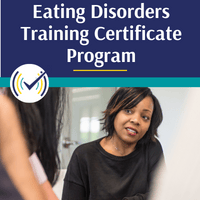
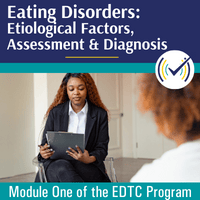
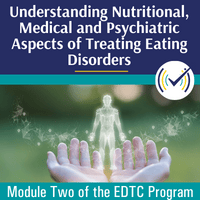
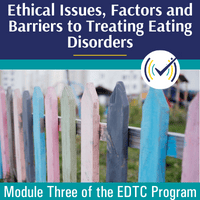
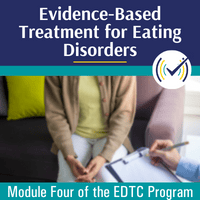

The course was so informative and I was glued to my screen for the entire duration. I received so much knowledge concerning ethics in telehealth and I am greatly encouraged to read about all the standards and policies that pertain to my practice. Thank you!.